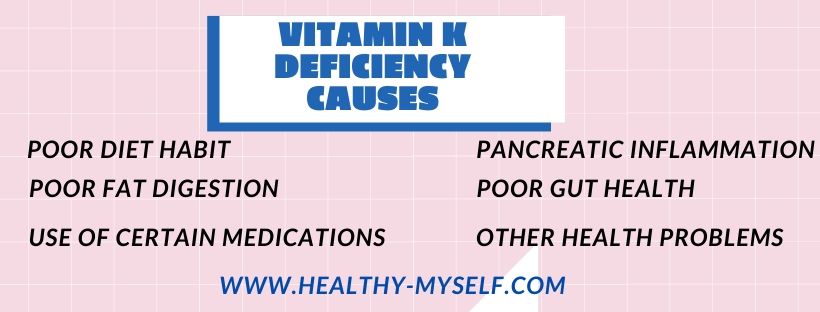Are You Missing [This]-Vitamin K Deficiency Update For -2021?

Are you ready to know-vitamin k deficiency?
Our health greatly depends on so many vitamins like Vitamin K and its nutrient plays an important role in numerous physiological processes.
Vitamin k contributes to blood clotting, and it is involved in bone metabolism also.
However, it’s of great importance to consume a sufficient amount of vitamin K foods on a daily basis.
________
Contents
1. What Is Vitamin K?
It is fat-soluble compounds, which include vitamin K1 i.e.-phylloquinone and vitamin K2 i.e.-a group of menaquinones.
Vitamin K1 is present in various foods which we have taken, while our body is able to produce vitamin K2.
Vitamin k deficiency causes-
2. Vitamin K Deficiency Causes –

As per research vitamin K deficiency occurs when you don’t consume enough from your diet.
When we are unable to absorb it properly then have decreased production in the gastrointestinal tract and have reduced storage due to liver disease.
Some Causes have given below-
2.1. Poor Diet habit:
Whatever diet we have taken should have contains all vitamins.
A diet’s lack of nutrients can increase your risk of deficiency.
The recommended adequate intake of vitamin k For Adults is- 90 mcg/day for women & 120 mcg/day for men.
2.2. Poor Fat Digestion-
The liver and pancreas health is essential for the digesting of fats.
As you know liver makes Bile and while the pancreas produces digestive enzymes.
Diseases affecting either of these organs reduce the body’s ability to break down, absorb, and use fat-soluble vitamins.
When Liver and bile duct disorders then both increased a marker of vitamin K deficiency.
However, supplementing probably won’t help.
2.3. Pancreatic Inflammation-
Sometimes due to Pancreas inflammation was accompanied by vitamin K deficiency also.
Cystic Fibrosis-
Cystic fibrosis damages the liver and pancreas. Some studies show that 70-95% had vitamin K deficiency, especially those who also had liver cirrhosis.s
Blocked Bile Flow-
Liver, pancreatic, and or gallbladder diseases can block bile flow, which reduces vitamin K absorption.
If the disorder occurs during pregnancy then high blood bile and low vitamin K levels increase and the risk of potentially deadly bleeding in the fetus.
Bleeding due to vitamin K deficiency is an early sign of blocked bile ducts in the new-borns child. It’s commonly resolved with vitamin K input.
2.4. Poor Gut Health:
Vitamin K is produced by the healthy bacteria in the digestive tract and any disruption in gut health can result in Vitamin k production.
2.5. Other Health Problems:
If some problem arises on gallbladder or biliary disease, liver disease, cystic fibrosis, gluten sensitivity, and celiac disease can also increase your chances of developing a deficiency of vitamin k.
2.6. Use of Certain Medications:
If you are using some medicines like-Blood thinners, long-term antibiotic use and cholesterol-lowering medications then it can all increase the risk of deficiency.
It may cause some times bleeding, birth anomalies, and even death also.
The most common causes are including here:
- Conditions that reduce vitamin K uptake
- Uncontrolled use of blood thinners or anti-seizure medication
- Eating disorders
Elderly People-
Several researchers found that a poorer vitamin K status in elderly people.
The main reasons for this deficiency were reduced dietary intake
- Higher use of antibiotics and blood thinners
- Likely to have conditions that reduce its absorption

3. Vitamin k symptoms-
3.1. Symptoms are as bellows-
However, vitamin K plays a key role in so many health benefits and disease prevention also.
When deficiency occurs then it causes a range of serious side effects and may impact the skin, heart, bones and vital organs & digestive tract also.
Here is a few vitamin K deficiency symptoms have given below:
- Excessive bleeding from wounds or tissue lining
- Internal bleeding happens
- Bruising easily not occur
- Heavy, painful menstrual periods observed
- Bleeding in the GI tract found
- Blood in the urine/stool often
- Bone density will-less
- From the umbilical cord stump and penis
- In the nose, skin, and digestive tract problem arises
If you or your baby have several of these symptoms then seek immediate medical attention and go to your doctor.
4. Vitamin k food sources-
Vitamin K Sources-
Vitamin K is present in a number of foods, so you can take easily your daily diet.
Various vegetables like- green leafy veggies, fruits are great sources of vitamin K1.
On the other hand, vitamin K2 is a source is- meat, dairy products, and eggs.
Here are some foods low in vitamin K are given below-
sweet corn
onions
potatoes
tomatoes
cucumbers
bananas
pineapple
apples
peaches.
However, if you want to increase your intake of vitamin K, then follow these foods which to be taken-
Soybeans-
Even when not fermented then also soybeans belong to foods rich in vitamin K.
Roasted soybeans of ½ cup serve 54% of the recommended daily need of this vitamin.
Kale-
These green leafy veggies are among the richest sources of this vitamin k. If you eat a cup of raw kale daily means, you will cover 141% of your DV of this essential nutrient.
Spinach-
Do you know that one cup of raw spinach contains 181% of your daily value of vitamin K?
Besides belonging to foods high in vitamin K, this green leafy veggie is rich in vitamin A, vitamin C, folate, and manganese also.
So it is a super addition to your eating plan.
Mustard Greens-
Like other green leafy vegetables, these mustard greens are also contain rich in vitamin K.
With one cup of boiled mustard greens, you will get 524% of your daily needs of this vitamin k.
Moreover, it provides a considerable amount of vitamin A, vitamin C, and folate also.
Kiwi Fruits-
This is another vitamin K rich fruits, and one of them is a kiwi.
One cup of this fruit contains 89% of the recommended daily value of this vitamin.
Furthermore, kiwi fruits are a rich source of vitamin C also.
So you can eat them to boost your immune system daily basis.
Avocados-
Avocados are highly nutritious fruit as they contain a variety of vitamins and minerals.
One cup of avocado contains -39% of the recommended daily value of vitamin K.
In addition, this type of fruit is a great source of dietary fiber, vitamin C, folate, vitamin B5, and huge potassium.
Grapes-
Grapes having a number of health benefits thank their high antioxidant content.
They are really a super source of vitamin K and a half cup of this fruit has 14% of the recommended daily value of this vitamin.
In addition, they are rich in vitamin C and little quantity of copper.
Chicken Breast-
Chicken breast contains one of the best foods high in vitamin K2.
A three-ounce of meat provides- 17% of your daily value of this vitamin k foods.
Beef-
Beef is another huge source of meat that vitamin K2.
Three ounces of broiled beef contains – 8% of the recommended daily value of this nutrient.
Eggs-
However Eggs are not particularly rich in vitamin K, but they provide a little quantity of this vitamin.
One large hard-boiled egg contains- 5% of your DV of vitamin K.
Vitamin k deficiency in adults
Here are some most common vitamin K deficiency symptoms as below:
- Excessive bleeding
- Easy bruising
- Heavy, painful menstrual periods
- Bleeding in the GI tract
- Blood in the urine/stool
- Bone density loss
5. Vitamin k deficiency in newborn-
5.1. Deficiency K and New-borns-

Researchers have known that newborn babies are born with a vitamin K deficiency, especially when in those who are born pre-term.
This deficiency, if severe enough, can cause certain diseases n newborn babies, such as a hemorrhagic disease, also known as HDN.
If left untreated then this could potentially cause intracranial hemorrhage and brain damage, although this is rare.
Not only has that, but the vitamin K content in breast milk been relatively low which can also contribute to a deficiency.
Vitamin k deficiency bleeding time
5.2. What is Vitamin K Deficiency Bleeding or VKDB?
Vitamin K deficiency bleeding or VKDB occurs when babies cannot stop bleeding as their blood does not have sufficient Vitamin K to form a clot.
The bleeding can occur anywhere on the inside or outside of the body.
Commonly, a baby with VKDB will bleed into his or her intestines, and or into the brain that can lead to brain damage and some times even death also.
Infants who do not receive the vitamin K shot at the time of birth can develop VKDB at any time up to 6 months of age.
There are 3 types of VKDB and based on the age group of the baby when the bleeding problems start such as- early, classical and late.
More information about these types is included below.
6. Natural remedies-
The number one way to prevent deficiency is by taking Vitamin k diet naturally.
Not only can consuming a variety of nutritious plant and animal foods provide plenty of vitamin K1 and K2, but it also helps to enhance gut health and absorption.
It’s best to get a good amount of vitamin K2 daily, especially from raw, fermented dairy products like raw cheese, yogurt, etc.
Other sources of vitamin K2 to be taken on a daily basis include grass-fed meat, wild-caught fish, egg yolks, and organ meats like liver.

7. Conclusion-

There is no perfect set amount of vitamin K that you should consume each day.
But on an average day, for men, it is 120 mcg and 90 mcg adequate for women.
Some foods like leafy green vegetables, are extremely high in vitamin K and will give you all you need in one serving.
A single shot of vitamin K at the time of birth can prevent a problem in newborns’ children.
People with conditions involving fat malabsorption should speak to their doctors about taking a vitamin K supplement and having their levels monitored.
You can read here also- https://en.wikipedia.org/wiki/Vitamin_K_deficiency
- I’d like to grow my readership. Can you help me out by sharing this blog post with your friends & colleagues?
- What other ideas can you have please write to us?

Hi, the Vitamin k deficiency:Causes,Symptoms,Sources &Natural Remedies-2020 is very good,
congratulations to healthy-myself.com’ authors.